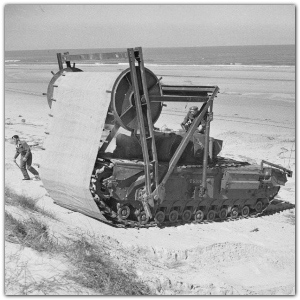
The Technology of D-Day
Spring Series – something different
This year the country commemorates the 80th anniversary of the Normandy Landings on 6 June 1944. To remember those who served in the Second World War, this quarter our Spring series is focused on the background and build-up to D-Day. It has a slightly different format. It comprises two online talks, of which this is the second. These can be booked individually or as a package – see separate event listing. A third separate but associated talk, on Thursday 27 June, is face-to-face. This needs to be booked and paid for separately (£12). As our special D-Day event it begins with a fish and chips lunch after which we will have a D-Day talk with Q&A afterwards.
About this talk
The large raid on Dieppe in August 1942 was a complete failure. However, it provided important lessons to the allies which, complemented by experiences of landings in North Africa during Operation Torch, made the D-Day Landings in 1944 a success. One of the key lessons learned was that special equipment and new tactics were needed to successfully mount an invasion. The technology of D-Day resulted from those lessons. But what did miniature submarines and divers have to do with the D-Day landings? What was a Bobbin or a Crab, and why did the Royal Engineers have their own special tanks? How did the allies control the beaches once troops were landing and how did they deal with the formidable German defences? What new medical provision was provided? How did this effect those that fought? Find out about all this and more in the Technology of D-Day.
To Book
Pre-booking is required, because the event link will be sent in advance.
To join this talk, you will need a computer device with speakers. Ideally, also a webcam and microphone. You also need to be able to access the internet from it. First-time users of Zoom, will be asked to download a small piece of software, which will be sent in advance.
To book – scroll down.
Image: Churchill Bobbin – Mapham J (Sgt), War Office official photographer, Public domain, via Wikimedia Commons (cropped)
Speaker
-
 Dr Richard Marks
Dr Richard MarksRichard is a published historian based in Berkshire who specialises in industrial, military, and railway history and also the history of science. His current areas of research are industrial development in the Victorian period, the development of the railway and canal systems in Britain in the mid to late 19th Century and the history of British Rail. He has a PhD in economic history. Richard’s book about British Rail Engineering was published by Pen and Sword in early 2024 and a new book is due out later in 2024 about the Wantage Tramway Company.
